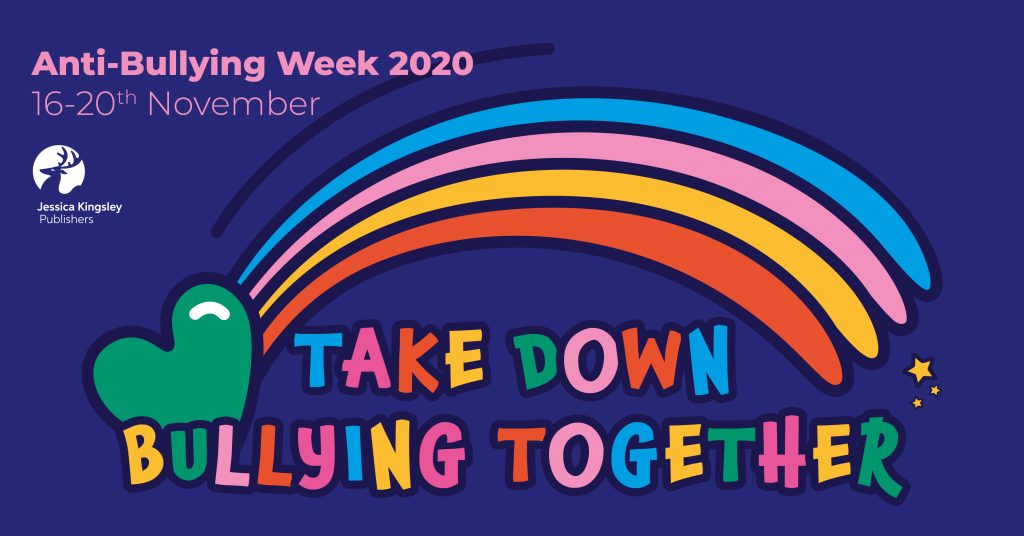
Dr Elizabeth Nassem is a consultant and researcher in school bullying and the author of ‘The Teacher’s Guide to Resolving School Bullying’ This article was first shared on the Leeds Trinity University blog.
Are Bullies Respected?
The theme of this year’s anti-bullying week is ‘United Against Bullying’. But are we really united against bullying? Numerous individuals have told me that they hate bullying and bullies. Yet pupils who bully are often popular, admired and respected. They are often liked by their teachers and can even receive favourable treatment from them. However, popularity can also lead to victimisation, particularly by children who are jealous of their popularity or sick of being bullied.
Who are the Bullies?
But do children who bully consider themselves as bullies? I have interviewed over 100 children in my research and no-one has identified themselves as a bully (Nassem 2012, Nassem 2019). Children felt coerced into victimising children who were identified as ‘vulnerable’ such as children with learning difficulties. They focused on being victimised rather than on the bullying they engaged in. Children who were physically aggressive to their peers explained that they were retaliating to being picked on by pupils and / or teachers.
Is Bullying Normal?
Bullying amongst children is entrenched in children’s everyday experiences of school. It is often normalised, accepted and remains unchallenged. The traditional understanding of bullying as a problem with a minority of individuals is misunderstood. All children are affected by being in an environment where bullying is present. Thus, we need to reflect upon what behaviours we accept as normal which might, in fact, constitute bullying. I started my own anti-bullying consultancy about ten years ago to support pupils and teachers to challenge normalised practices which enable bullying.
Interventions in Schools
My anti-bullying work focuses on working directly with pupils to understand and resolve their specific experiences of bullying. I start by interviewing pupils and staff to investigate pupils’ experiences of bullying. After the interviews I develop interventions with pupils and teachers tailored to pupil’s specific experiences of bullying. These interventions include a mentoring programme for children who persistently engaged in bullying. Mentoring addresses the underlying reasons behind the bullying and supports mentees to interact with their peers and teachers more respectfully. I directly involve children in campaigning against bullying and I have supported them to design and present anti-bullying assemblies to younger pupils. I help pupils to respectfully and successfully challenge how they interpret and respond to bullying. This involves reflecting on why the child might be bullying them, construct themselves more positively and effectively support those who are victimised. From this work, pupils have reduced their engagement in bullying, increased their empathy towards other children; and exercised their voice more articulately.
Educating the Public
Whilst I developed anti-bullying interventions, I wrote my book ‘The Teacher’s Guide to Resolving School Bullying: Evidence-Based Strategies and Pupil-Led Interventions’ which was published last year. I have written for The Guardian, had interviews on BBC radio and my research has featured in The Telegraph. I have also provided training about my research at university to students in Education and to teachers for local authorities such as Wakefield and Kirklees.
Back to School
Determined to help children deal with bullying more directly, I taught in secondary schools again. Sadly, the punitive culture in schools had grown. As a pastoral teacher my role involved supervising children in isolation classrooms when they had been sent out of their lessons for misbehaving. In isolation, children were forced to work in silence, told to ‘shut up’ by their teachers when they spoke and given the same ‘boring’ worksheet to do for days and weeks. Unfortunately, I wasn’t in the right position to make a significantly positive difference in these schools.
Informing the Government
The government needed to know about my research. So, I met with senior officials in the DfE and I was an invited expert for the Ofsted policy team who were interested in my pupil-led interventions and mentoring programme. I have also met with the Minister of Children and Families online about bullying in schools. When the Minister mentioned how seriously the government are taking mental health in pupils, I explained how children with mental health problems are being placed in isolation classrooms. I have met children who have previously attempted suicide who are being placed in these isolation classrooms; their mental health needs unmet. If children are to be taken out of lesson then the underlying reasons for their behavioural problems should be addressed, and they need to be taught how to improve their behaviour and wellbeing. As a lecturer in Special Educational Needs, Disabilities and Mental Health at Leeds Trinity University I embed my research into teaching the next generation about children’s mental health and wellbeing so that these children can flourish and achieve their potential.
References
Nassem, E. (2012) ‘Where does bullying exist in children’s everyday experiences of school?’ University of Huddersfield, Huddersfield.
Nassem, E. (2019) The Teacher’s Guide to Resolving School Bullying: Evidence Based Strategies and Pupil-Led Interventions. London: Jessica Kingsley.